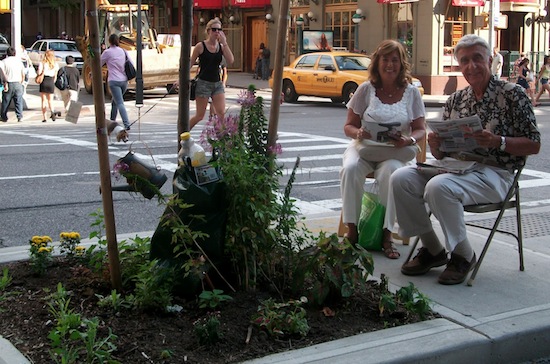
This Friday, New Yorkers will take part in Park(ing) Day, repurposing dozens of parking spaces around the city to show what you can do with valuable curbside real estate besides storing cars. Last year, participants set up everything from "alternate side mulching" to an entire dorm room, complete with walls and a television set, to help New Yorkers re-imagine the potential uses of their streets.
One New Yorker who needs no help re-imagining the curb is Arnold Bob, who prefers to go by "Ranger Bob, commissioner of Park Chelsea." As reported by DNAinfo's Matthew Katz, he's proposing to turn one parking space on every block from 14th to 34th Streets, between Fifth Avenue and the Hudson River, into a what he calls a micropark. All told, it would add up to more than 100 small-scale public spaces where neighbors could meet up, take a breather, or plant a garden.
Bob started lobbying for the microparks after realizing that they offered a way to resolve one of the neighborhood's most intractable planning disputes. "In Chelsea, there was a debate going on over affordable housing versus parks," he explained. "I could get affordable housing done and parks at the same time." All it would take is a willingness to rethink street space -- leave the developable land for housing, and put the parks next to the curb.
Park Chelsea, Bob's organization, has already set up their own permanent micropark -- not in a parking spot but on the planted section of an Eighth Avenue pedestrian island. The Eighth and Ninth Avenue redesigns, or as Bob called them, "greenways," could be just the beginning of bringing public pedestrian space to the streetbed in Chelsea.
His ideal microparks, he said, would have protective fencing and public seating like New York's pop-up cafés, as well as features like community bulletin boards and green infrastructure to prevent stormwater overflows from dumping sewage into the Hudson. "If you put these on every block," said Bob, "you'll have a park within a one or two minute walk of everybody."
Ranger Bob said he's spoken with Community Board 4 about the proposal. They were supportive of the concept, though skeptical of its feasibility at full scale. With only a handful of pop-up cafés in place so far, they're probably right that 100 is a distant goal. Still, Bob has a plan to win over opponents who don't want to see fewer parking spaces: Pair each micropark with on-street space for car-share vehicles. Bob argued that the addition of each shared car would make up for the removal of multiple parking spaces for personal vehicles -- a tradeoff he believes can create some physical and political room for his vision.





